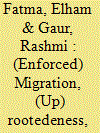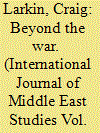| Srl | Item |
| 1 |
ID:
185591


|
|
|
|
|
| Summary/Abstract |
This article argues that expressions of postmemory—a form of relationship that a generation has with its antecedants, as proposed by Marianne Hirsch—are writ large in the descendants of the Kashmiri Pandits who fled from the Kashmir Valley in the 1990s and before then. Through a close reading of two novels by Kashmiri writers, Siddhartha Gigoo’s The Garden of Solitude and Rajat Mitra’s The Infidel Next Door, this article analyses the prevalence of guilt, curiosity and the yearning to (re)connect with a lost home that is evident amongst subsequent generations in relation to their parents’ and grandparents’ forced migration from Kashmir. We demonstrate that the idea of postmemory provides a useful framework for understanding the feelings of simultaneous attachment to and generational distance from the past.
|
|
|
|
|
|
|
|
|
|
|
|
|
|
|
|
| 2 |
ID:
101169


|
|
|
|
|
| Publication |
2010.
|
| Summary/Abstract |
This article seeks to address how Lebanese youth are dealing with the legacy of civil war (1975-90), given the national backdrop of official silence, persisting injustice, and competing memory discourses. Drawing on Marianne Hirsch's concept of postmemory, it explores the memory of a generation of Lebanese who have grown up dominated not by traumatic events but by narrative accounts of events that preceded their birth. This residual form of memory carries and connects with the pain of others, suffusing temporal frames and liminal positions. The article examines how postmemory is mediated and transformed through the mnemonic lenses of visual landscapes and oral narratives. Consideration is given to the dynamic production of "memoryscapes"-memories of violence localized in particular sites-and to narrative constructions of the past implicated in the ongoing search for meaning, historical truth, and identity. This article seeks to challenge pervasive notions of Lebanese postwar amnesia and of a generational detachment from the residual effects and future implications of war recollections.
|
|
|
|
|
|
|
|
|
|
|
|
|
|
|
|